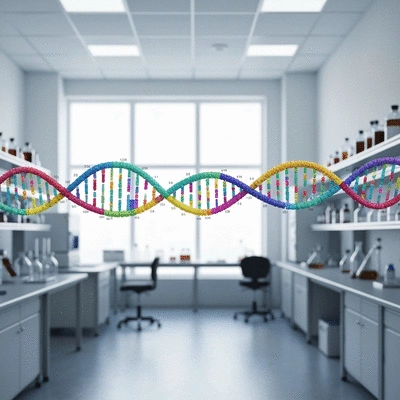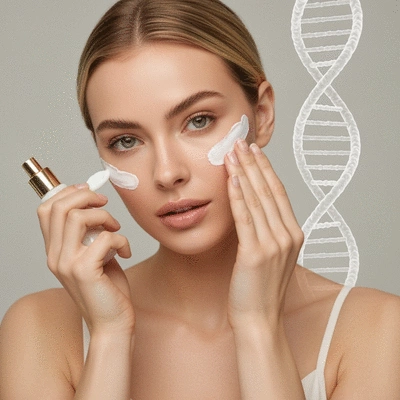Ever wondered why some people are more prone to acne than others? The answer often lies in their genetic makeup. By understanding the genetic factors behind acne, you can take proactive steps in your skincare journey.
What You Will Learn
- Genetic predispositions significantly influence the likelihood and severity of acne development.
- Family history is a strong indicator of potential acne issues, with up to 80% of individuals experiencing a familial link.
- Specific genetic markers, such as IL-1β and CDH13, play crucial roles in skin inflammation and oil production.
- Understanding your unique genetic factors can help tailor personalized skincare routines and treatments.
Genetic Factors in Acne Development
Delving into the genetic influences behind acne, this visual highlights key factors and statistics that determine an individual's susceptibility and the severity of the condition.
Genetic Predispositions to Acne
Factor 1: Family History
Higher chance if parents or siblings had acne.
Factor 2: Skin Type
Genes influence oily, dry, or combination skin types.
Factor 3: Inflammatory Responses
Inherited heightened responses can exacerbate acne.
Key Genetic Markers
Family History & Acne Incidence
80%
of individuals with acne have a family history of the condition.
Understanding Genetic Factors in Acne Development
Acne is often thought to be purely influenced by lifestyle choices or environmental factors, but the truth is it can also be deeply rooted in our genetics. Understanding genetic factors in acne development can empower you to take control of your skincare journey. Let’s dive into what genetic predispositions mean and how they can impact your skin health!
As a board-certified dermatologist, I’ve seen firsthand how a person’s genetic makeup can contribute to the severity of their acne. By educating ourselves on these genetic influences, we can make more informed decisions regarding our skincare routines and treatments.
What Are Genetic Predispositions to Acne?
Genetic predispositions refer to the inherited traits that may make someone more likely to develop acne. Research indicates that certain genes are linked to the skin's oil production and inflammation responses, which can be crucial in determining who develops acne and how severe it may be.
- Family History: If your parents or siblings had acne, you might have a higher chance of experiencing it too.
- Skin Type: Genes can influence skin type—oily, dry, or or combination—which can affect acne development.
- Inflammatory Responses: Some individuals may inherit a heightened inflammatory response that can exacerbate acne.

Understanding these core aspects can help identify your personal risk factors. I often remind patients that while genetics play a role, they aren’t the only factor in acne development.
Key Genetic Markers and Their Roles
Research has identified various genetic markers associated with acne. These markers can influence how your skin responds to hormonal changes and environmental stressors. Some key markers include:
- IL-1β: This gene regulates inflammation and can increase acne severity.
- TSEN54: Linked to skin barrier function, influencing how well your skin resists acne triggers.
- CDH13: Associated with sebum production, which is a critical factor in acne formation.
By understanding these markers, you have the opportunity to tailor your skincare strategies more effectively, as suggested by research on genetic discovery and better acne treatments. It’s essential to consult with a dermatologist to interpret these genetic factors accurately.
How Genetics Influence Acne Severity Over Time
Your genetic makeup doesn’t just impact your likelihood of developing acne; it also influences how severe it may become. For instance, those with a family history of severe acne may experience persistent breakouts into adulthood.
It’s fascinating how genetics can dictate the course of acne. For example, studies show that individuals with specific genetic markers are more prone to inflammatory types of acne, which can lead to scarring if not treated promptly. Understanding this timeline can help you take proactive steps in managing your skin.
What Is the Connection Between Family History and Acne?
Family history is a powerful indicator of your potential for acne. If you find that multiple members of your family have struggled with acne, it’s worth considering how this might shape your own experience.
At Acne Clarity Hub, our mission is to empower you with knowledge, and understanding your family’s skincare history is a vital part of that. Let’s explore how family history serves as a predictive factor.
The Role of Family History as a Predictive Factor
Your family's battles with acne can provide insight into your skin's genetic makeup. If both parents faced significant acne issues, the odds are increased that their children might, too. By recognizing this pattern, you can take steps to mitigate risks!
Statistics on Acne Incidence Among Family Members
Research shows that up to 80% of individuals with acne have a family history of the condition. This statistic, highlighted in studies such as those published in the Annals of Human Genetics, underscores the importance of recognizing familial patterns. It's not just coincidence! Understanding these figures can help motivate you to seek preventative measures.
Insights from Family Studies on Genetic Links to Acne
Family studies provide compelling evidence of genetic links to acne. For instance, researchers have found that twins often share similar acne profiles, suggesting a strong genetic component. These insights, further explored by institutions like the QIMR Berghofer Medical Research Institute, can help us understand that while acne can feel isolating, you’re not alone.
In my practice, I encourage patients to reflect on their family’s skin health narratives. It’s amazing what we can learn from our origins!
Pro Tip
Did you know? Genetics can influence not only the likelihood of developing acne but also the effectiveness of certain treatments? Consider discussing your family history and any genetic testing results with your dermatologist. This can help them recommend personalized treatment options that align better with your unique genetic makeup, making your acne management journey more effective.
Summarizing the Genetic Insights into Acne
As we wrap up our exploration of the genetic factors behind acne, it’s crucial to highlight the key takeaways that can empower you on your skincare journey. Understanding that acne is not just a superficial skin issue but often intertwined with genetic predispositions can help in identifying effective treatment paths. Here’s a quick recap of what we’ve covered:
- Genetic influences play a significant role in the development and severity of acne.
- Your family history can be a strong indicator of your likelihood to experience acne.
- Environmental factors and hormones can further complicate genetic predispositions.

By recognizing these elements, you will be better equipped to tackle your unique skincare challenges. Knowledge is power, and with the right information, you can make informed choices that lead to clearer skin!
Frequently Asked Questions About Genetic Acne
- What are genetic predispositions to acne?
- Genetic predispositions refer to inherited traits that make individuals more susceptible to developing acne. These traits include factors like skin type, oil production, and inflammatory responses, which are influenced by specific genes.
- How does family history affect my risk of developing acne?
- Family history is a strong indicator of acne risk. If your parents or siblings experienced acne, especially severe forms, you have a significantly higher chance of developing it yourself. Studies show that up to 80% of individuals with acne have a family history of the condition.
- What are some key genetic markers associated with acne?
- Key genetic markers associated with acne include IL-1β, which regulates inflammation and can increase acne severity; TSEN54, which influences skin barrier function; and CDH13, which is linked to sebum production. Understanding these markers can help in tailoring effective skincare strategies.
- Can genetics influence the severity of my acne?
- Yes, genetics can significantly influence not only the likelihood but also the severity and persistence of acne. Individuals with certain genetic markers or a family history of severe acne may experience more inflammatory types of acne or breakouts that continue into adulthood.
- What proactive steps can I take if I suspect my acne has genetic roots?
- If you suspect your acne has genetic roots, proactive steps include consulting a dermatologist for personalized treatment options, considering genetic testing to understand specific predispositions, and incorporating lifestyle changes that align with your genetic profile to mitigate acne risk.
Next Steps for Individuals Concerned About Acne
So, what can you do if you’re concerned about acne and suspect it might have genetic roots? Here are some proactive steps you can take:
- Consider genetic testing to understand your specific predispositions.
- Consult with a dermatologist to discuss personalized treatment options tailored to your genetic background.
- Incorporate dietary and lifestyle changes that may mitigate your acne risk based on your findings.
It’s essential to approach your skincare routine with a strategy that acknowledges your genetic makeup. At Acne Clarity Hub, we believe that understanding these factors can encourage you to take proactive measures for your skincare regimen.
Understanding the Role of Skin Microbiome in Acne Management
Lastly, let’s not forget the skin microbiome! This ecosystem of microorganisms plays a vital role in maintaining skin health and can influence acne development. By focusing on products and routines that support a balanced microbiome, you may enhance your skin's resilience against breakouts.
By integrating insights from genetics, family history, and microbiome health into your acne management plan, you can pave the way toward clearer, healthier skin. Remember, you’re not alone in this journey—every step you take brings you closer to the skin you’ve always wanted!
Recap of Key Points
Here is a quick recap of the important points discussed in the article:
- Genetic influences play a significant role in the development and severity of acne.
- Your family history can be a strong indicator of your likelihood to experience acne.
- Environmental factors and hormones can further complicate genetic predispositions.
- Identifying key genetic markers can help tailor your skincare strategies effectively.
- Proactive steps, such as consulting with a dermatologist and considering genetic testing, can benefit your skincare journey.









